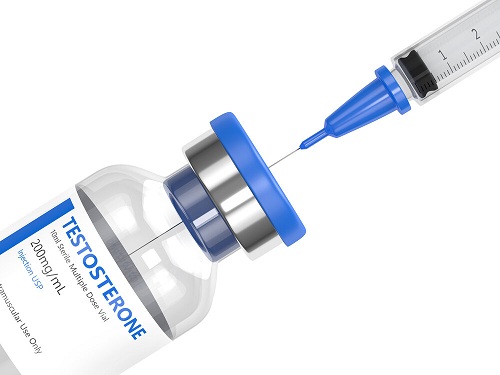Diabetes News: Australian Randomized Double Blind Placebo-Controlled Clinical Trial Shows That Testosterone Can Prevent Type 2 Diabetes In Males
Source: Diabetes News Dec 16, 2020 4 years, 4 months, 1 week, 3 days, 7 hours, 56 minutes ago
Diabetes News: Australian researchers led by the University of Adelaide that involved six specialist centers across Australia have in the largest randomized trial ever conducted investigating testosterone treatment shown that, over and above the effect of a lifestyle program, treatment with testosterone prevents or reverses newly diagnosed type 2 diabetes in men.

Men who are overweight or obese frequently have low serum testosterone concentrations, which are associated with increased risk of type 2 diabetes.
The study team aimed to determine whether testosterone treatment prevents progression to or reverses early type 2 diabetes, beyond the effects of a community-based lifestyle programme.
The clinical study, known as T4DM (Testosterone for the prevention of Diabetes Mellitus), was a two-year randomized, double-blind, placebo-controlled clinical trial.
The study findings were published in the peer reviewed journal: The Lancet Diabetes & Endocrinology.
https://www.thelancet.com/journals/landia/article/PIIS2213-8587(20)30367-3/fulltext#%20
The T4DM study included more than 1000 men aged between 50 and 74 years old who were overweight or obese. All men were enrolled in the WW (formerly known as Weight Watchers) lifestyle program. They could attend groups, use the website, the app, or any combination of those. Half of the men were injected with long-acting testosterone every three months and the other half were injected with placebo.
Men with a waist circumference of 95 cm or higher, a serum testosterone concentration of 14·0 nmol/L or lower but without pathological hypogonadism, and impaired glucose tolerance (oral glucose tolerance test [OGTT] 2-h glucose 7·8–11·0 mmol/L) or newly diagnosed type 2 diabetes (provided OGTT 2-h glucose ≤15·0 mmol/L) were enrolled in a lifestyle programme and randomly assigned (1:1) to receive an intramuscular injection of testosterone undecanoate (1000 mg) or placebo at baseline, 6 weeks, and then every 3 months for 2 years. Randomization was done centrally, including stratification by centre, age group, waist circumference, 2-h OGTT glucose, smoking, and first-degree family history of type 2 diabetes. The primary outcomes at 2 years were type 2 diabetes (2-h OGTT glucose ≥11·1 mmol/L) and mean change from baseline in 2-h OGTT glucose, assessed by intention to treat. For safety assessment, the study team did a masked monitoring of haematocrit and prostate-specific antigen, and analyzed prespecified serious adverse events.
It was found that after two years of treatment, 87 out of 413 (21%) men in the placebo group had type 2 diabetes (based on an oral glucose tolerance test) compared with 55 out of 443 (12%) men in the testosterone group.
Males in both groups lost weight (on average 3 to 4kg) and glucose tolerance normalized in 43% and 52% of men in the placebo and testosterone groups, respectively.
There were also other significant findings at two years in men treated with testosterone compared to placebo:
-A lower fasting blood sugar
-A greate
r decrease in body fat
-An increase in skeletal muscle mass and hand grip strength
-Improvements in sexual function
-There were no differences in wellbeing or quality of life.
-The most common adverse effect occurring in 22% of men treated with testosterone was an increase in the concentration of red cells in the blood, which could potentially lead to "sludgy" blood.
Professor Dr Gary Wittert, director of the Freemason's Center for Male Health and Wellbeing, University of Adelaide and lead researcher told; Thailand Medical News, "The results of the study show that, on top of modest weight loss achieved with healthy eating and increased activity, testosterone has some added benefit to prevent or reverse newly diagnosed type 2 diabetes. However, the results do not necessarily mean that a script for testosterone should be written. We know that men at risk of type 2 diabetes are usually overweight and either have, or are at risk of, other chronic disorders that have not been detected or adequately managed. Not infrequently these men are also drinking too much alcohol and have sleep or mood disorders. Weight loss achieved through healthy lifestyle behaviors remains the benchmark."
Further research is needed to determine whether the beneficial effects of testosterone persist beyond two years, whether longer term treatment is safe and whether other forms of testosterone have similar benefits or risks.
Professor Wittert added, "Writing a prescription might be quick and easy but it does not replace the need for undertaking a comprehensive assessment and providing holistic management towards improving men's health."
Dr Bu Yeap, a professor from the University of Western Australia's Medical School, and president of the Endocrine Society of Australia, who was an investigator on the study, said: "This is a landmark study which will prompt renewed interest in preventing diabetes in at-risk men."
The study team concluded, ”Testosterone treatment for 2 years reduced the proportion of participants with type 2 diabetes beyond the effects of a lifestyle programme. Increases in haematocrit might be treatment limiting. Longer-term durability, safety, and cardiovascular effects of the intervention remain to be further investigated.”
For the latest
Diabetes News, keep on logging to Thailand Medical News.
